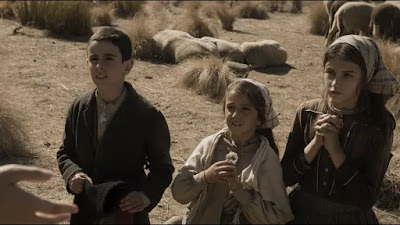Released on August 28th, 2020, Fatima is directed by Marco Pontecorvo and written by Pontecorvo and Valerio D’Annunzio, the film was produced by Origin Entertainment. It tells the story of the famous apparition of the Blessed Virgin Mary to three Shepard children in Fátima, Portugal.
Fatima takes a (fairly) subtle approach to the oft-told story. Pontecorvo and Annunzio's script avoids using expository dialogue, instead requiring the viewer to follow the events as they proceed. It is certainly a respectful, even if it takes some liberties with historical fact. What is, perhaps, the film's main central source of conflict, the disapproval of Lucia's mother, Maria Rosa (Lúcia Moniz), of her claims to have seen the Holy Virgin, is fueled, largely, by the fact that her older brother, Manuel, is fighting in the First World War. Maria is convinced that he will be brought home safe if only she prays hard enough and obtains their favor. She views her daughter's claims as dreadful lies which will offend God and the Blessed Mother, and could jeopardize her "favor" in their eyes. In reality, Maniel Dos Santos did not fight in the war, though one of Lucia's cousins did.
It is likely that the filmmakers made this change for two reasons. First of all it helps to make Lucia's mother more relatable and sympathetic. Secondly, it gives the main characters a direct connection with the Great War. For the people of Portugal (and indeed most of Europe) at this time the war was a all-encompassing concern, and the Fatima message dealt with the war directly on many points. Since Lucia is the point of view character and, as I said, the film tries to avoid too much exposition, having her brother be involved in the war helps to contextualize the apparition within its historical setting.
It is to the film's credit that, while it is compresses many of the visions for the sake of brevity, it never waters down the message of Fatima for a secular (or Protestant) audience. The films opening titles, which establish that Portugal had recently become a Republic guided by liberal, enlightenment values ideas, implicate these ideas as being opposed to Catholicism and religion in general. The mayor of Fatima, Arturo (Goran Visnjic), is very much an modern "enlightened" man. He sees the children's story as a primitive superstition, one that threatens the ideological foundation of the new Republic. Like Lucia's mother, the film softens its portrayal of Arturo. He does not threaten the children with being boiled in oil if they continue to maintain their story. He is portrayed somewhat like Pontius Pilate in The Passion of the Christ (2004) as a man torn between his loyalty to the government and his innate sense of justice. This parallel between Arturo and Pilate is amplified by the mayor's wife, Adelina (Iris Cayatte), who, like Pilate's wife Claudia, is a believer and clashes with her husband over his actions.
Other changes to the story are less justified. While in real life, the three seers performed many extreme acts of penance in accord with the commands of both Our Lady and the Angel of Fatima, including wearing tight cords around their waists and flogging themselves with stinging nettles. In the film however, the Blessed Mother asks them to stop these practices. Likely, the filmmakers were worried that young, overzealous viewers might decide to imitate Jacinta, Francisco and Lúcia in these practices, which could certainly lead to backlash from concerned parents. If that is the case, perhaps they should have simply left these scenes out completely rather then altering the facts. Conversely, while I appreciate the inclusion of the seers vision of hell (always a controversial topic even among believers) the resulting, CGI-laden scene, is rather hokey, and was perhaps was best left on the cutting room floor.
This scene stands in contrast to the films approach to the supernatural, which is much more impressionistic, relying on suggestive camerawork and lighting rather then special effects. The film is well shot in general.The director (the the son of acclaimed director Gillo Pontecorvo (Battle of Algiers) was a cinematographer on HBO's Rome and clearly has a good eye for visuals as does cinematographer Vincenzo Carpineta, a frequent collaborator of Pontecorvo who was also involved in such acclaimed pictures as The English Patient. Pontecorvo also handles his young actors quite well and Jorge Lamelas (Francisco), Alejandra Howard (Jacinta) and especially Stephanie Gil (Lucia) hold their own against their older, more experienced co-stars.
It is interesting to note that Pontecorvo is not himself a Catholic. This may well inform some of the non-Catholic characters in the film. Arturo Santos, as I mentioned, is more sympathetic here then in other Fatima movies. Also of note is the respectful relationship portrayed between an adult Sr. Lucia (Sônia Braga) and the skeptical Professor Nichols (Harvey Keitel). The professor's interview with Lucia for his prospective book serves as a framing device for the film. While I appreciate its nuanced portrayal of this (fictional) relationship it's also a little heavy handed at times. As the film close not with a conversation between the two but instead ends, somewhat abruptly, immediately after the Miracle of the Sun, this framing device is left feeling a little underdeveloped. More critically, we are left with no real idea of the ultimate impact of this miracle.
Despite its flaws, Fatima remains a respectful retelling of this important event. In today's godless, secularized atmosphere, that's a minor miracle in itself.
Score: 8/10






No comments:
Post a Comment